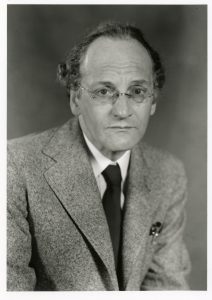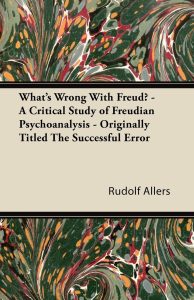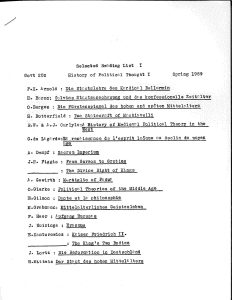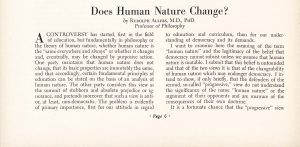December 14, 2023 is the sixtieth anniversary of the death of Dr. Rudolph Allers, Austrian born psychiatrist, surgeon, author, and professor of Georgetown and Catholic universities. A refugee from Nazi occupied Austria, and, initially a Freudian, he became increasingly opposed to Psychoanalysis, notably publishing several critical articles and books based upon a Catholic philosophical perspective.

Allers was born in Vienna on 13 January 1883, the son of Mark Allers, a doctor of Jewish extraction, and Augusta Grailick. He was a graduate of the Vienna Gymnasium and university medical school, earning his M.D. in 1906. In 1908, Allers married Carola Meitner, a sister of famed nuclear physicist Lise Meitner, who, like Allers, later taught at Catholic University. He served as an assistant in the clinic for mental and nervous diseases at Prague and in Munich, 1908-1918, and head of the department of medical psychology at the Institute of Physiology in Vienna, 1919-1938. During the First World War, as a surgeon, he served in a military field hospital on the Eastern Front, and was honored with the Golden Cross of Merit with the Crown and the Medal of the German Red Cross.

After the war, Allers’ students included both Viktor Frankl and Hans Urs von Balthasar. Balthasar and Allers’ friend, the future saint, Edith Stein, both lived at his home in Vienna in 1931. A devotee of the method of St. John Bosco, Allers studied the philosophy of St. Thomas Aquinas at the Catholic University of the Sacred Heart in Milan, Italy, taking a Ph.D. in 1934. Allers was the only Catholic member of the Freud’s first Psychoanalysis group. Later, he and Alfred Adler moved away from Freud, with Allers eventually separating himself from Adler as well. Essentially, whereas Freud simplifies all neuroses into a physical common denominators, Allers argued mental disorders are radically metaphysical. Though not as prominently featured, Allers was also critical of Carl Jung view that God was not a transcendent reality of future life but an archetype of a subjective human need. Though born and educated as a Catholic, Allers stated he “had not developed a real faith” until later as his career progressed and study deepened. Eventually, he moved towards Catholic intellectual circles, becoming a dedicated follower of Scholasticism.

After the annexation Anschluss (annexation) of Austria by Nazi Germany in 1938, Allers emigrated to the United States, where settled in the area of Washington, D.C., teaching first at Catholic University, 1938-1948, and then at Georgetown University, 1948-1963. Among the courses he taught at CatholicU were Psychology and Philosophy of Mind and the Seminar in Psychology. One wonders if a troubling incident involving Allers in the summer of 1948 had any bearing on his decision to leave CatholicU for Georgetown that same year. According to the 6-26-1948 issue of The Washington Post, Allers called the Police stating he had been called by a Major Francis Riley of Columbia road threatening to “kill some people and myself.” After being promptly arrested, Riley admitted he had called Allers and threated to kill “some people,” but never claimed he would kill himself!
Allers became a Guggenheim Fellow in 1958 and was a member or high ranking officer of the Washington Philosophical Club, Metaphysical Society of America, New York Academy of Science, American Philosophical Association, and the Medieval Academy of America. He was fluent in German, English, French, Italian, and Latin, writing more than a hundred articles in German and dozens more in English. He also wrote several books, including two highly critical of Freud and his methods: The Successful Error: A Critique of Freudian Psychoanalysis. Sheed and Ward Inc, 1940, and What’s Wrong With Freud? A Critical Study of Freudian Psychoanalysis. Roman Catholic Books, USA, 1941.

Allers died at Carroll Manor, the Archdiocese of D.C. Home for the Aged and Infirm in Hyattsville, MD. Services were held for him at Holy Trinity Church in Georgetown and burial in St. Mary’s Cemetery. Special thanks to Claudia Allers for her recent donation of Allers materials, and to Hannah Kaufman for everything else. For more information, please contact Special Collections at Catholic University.
